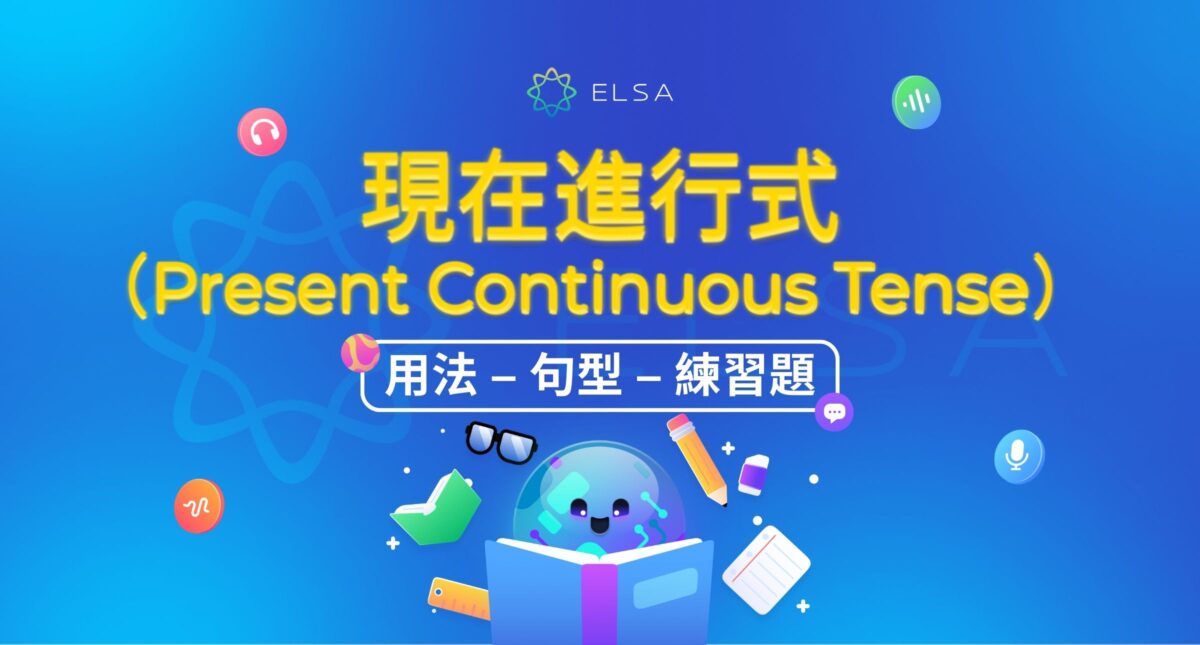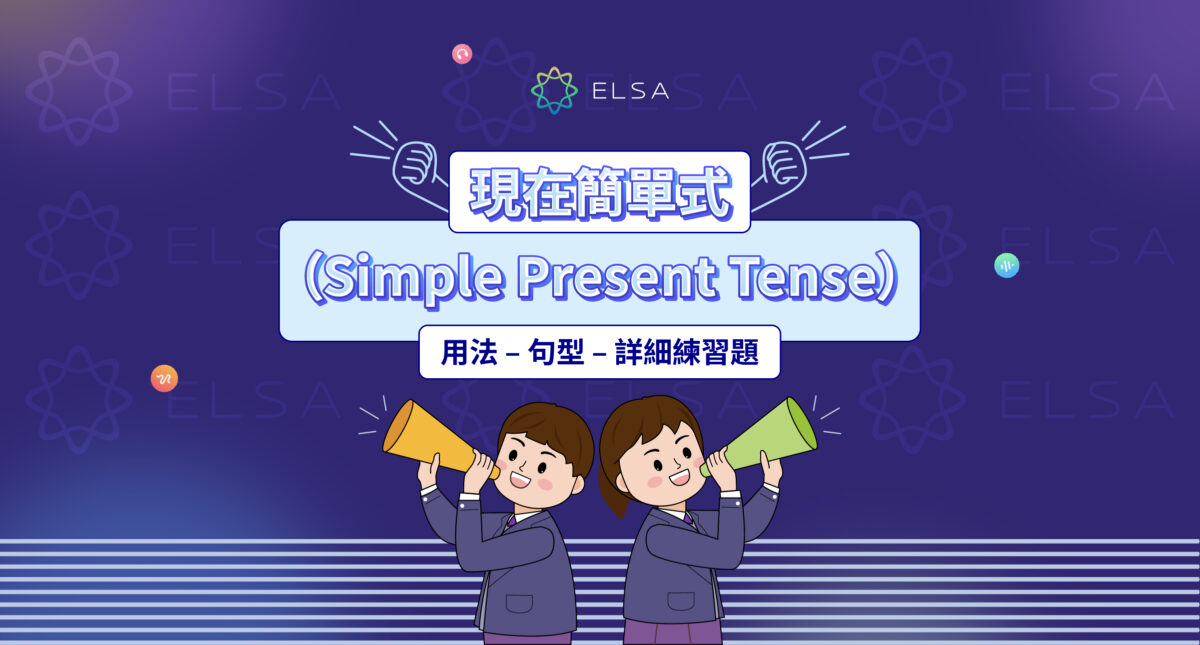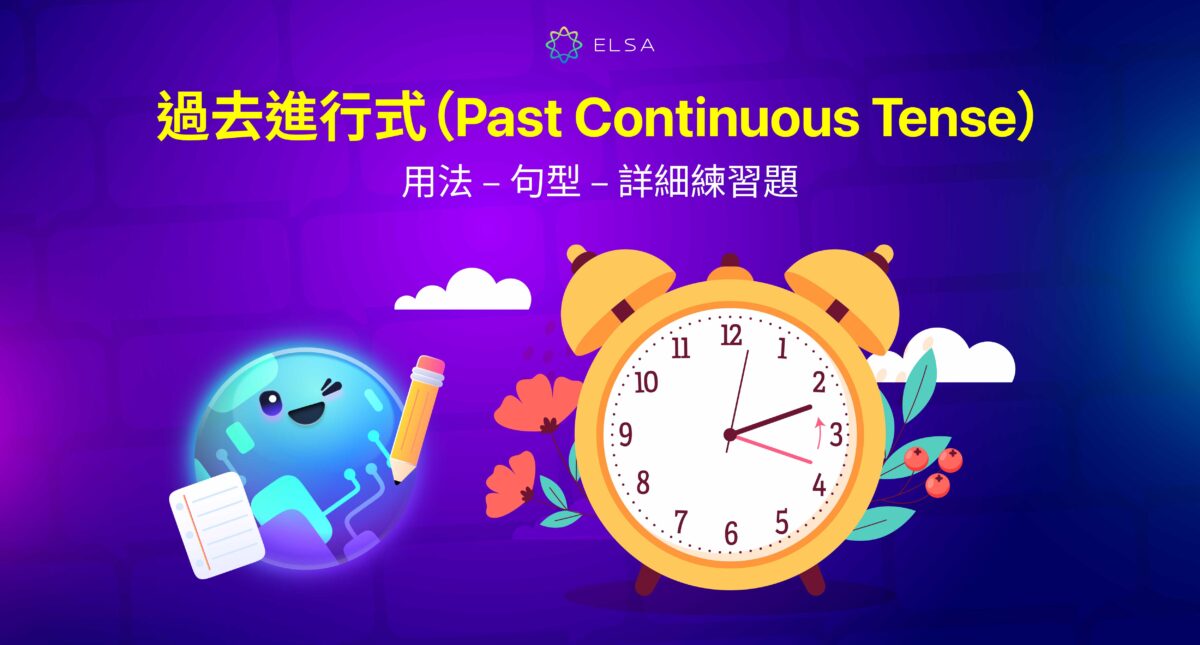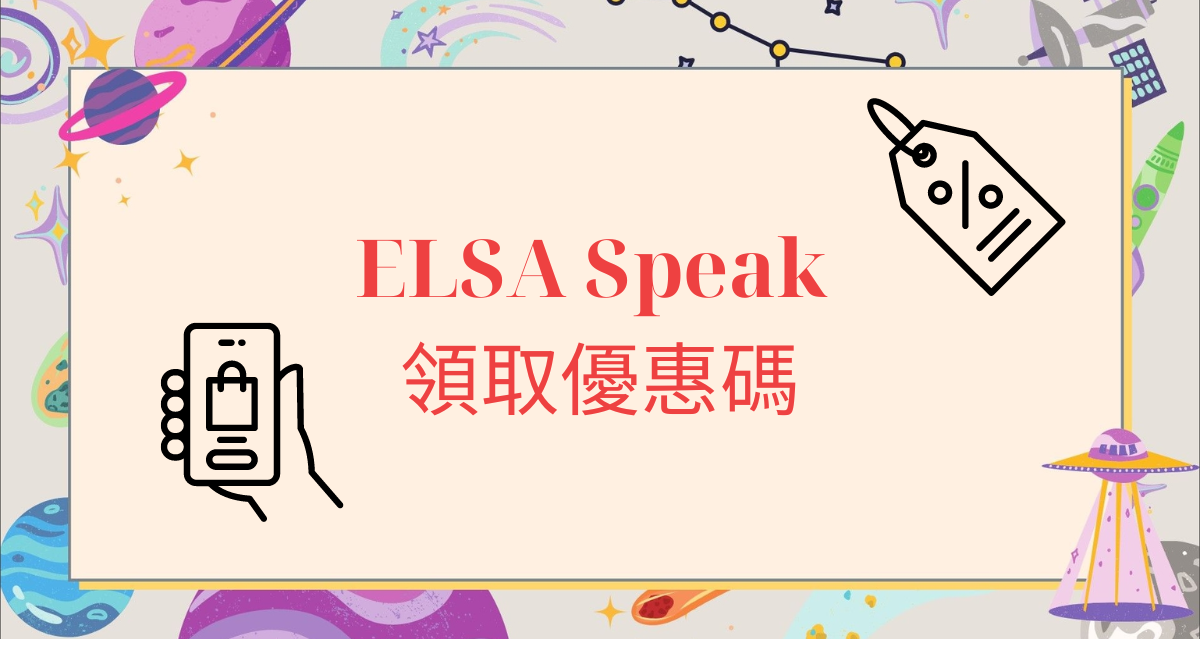您對名詞子句感到疑惑嗎?想掌握這種子句的結構和用法來豐富句子表達?與 ELSA Speak 一起了解名詞子句是什麼吧!
名詞子句 意思

名詞子句 英文是 Noun clause,是指具有主語和動詞的子句,但在句中起名詞的作用。名詞子句連接詞包括 if 或 whether,以及疑問詞如 what, where, when, why, how 等,或 that。
注意: 名詞子句以連詞開頭。
例句: What I told everyone at the party surprised them.
大致翻譯: 我在派對上告訴大家的事情讓他們感到驚訝。
名詞子句的結構
基本結構
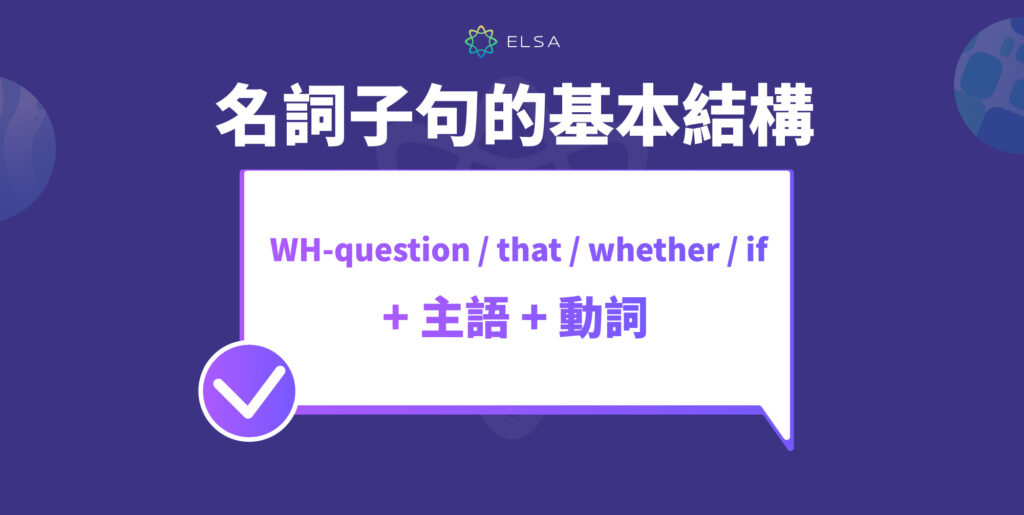
例句:
| 名詞子句開頭 | 含義 | 例句 | 大致翻譯 |
| that | 關於……的事情 | That the boy can play the piano at his young age is very impressive. | 這個男孩從小就能彈鋼琴真的很令人印象深刻。 |
| what | 那些……的事情 | What he said to his teacher was unacceptable. | 他告訴老師的事情完全無法接受。 |
| who | ……的人 | We need to find who will be in charge of this project. | 我們需要找到誰將為這個項目負責。 |
| why | ……的原因 | I don’t understand why children hate vegetables. | 我不明白為什麼孩子們這麼討厭吃蔬菜。 |
| where | ……的地方 | Many young people nowadays are worried about where they can find jobs. | 現在很多年輕人擔心他們能在哪裡找到工作。 |
| when | ……的時間 | The couple is still deciding on when they will get married. | 這對情侶仍在決定他們什麼時候結婚。 |
| which | 哪一個…… | I still haven’t known which course I should take next semester. | 我還不知道下學期我會選哪門課。 |
| how | ……的方法 | Being honest and loyal is how you build a true relationship. | 誠實和忠誠是建立真正關係的方法。 |
| whether/ if | 是否…… | I am not sure if teaching is a suitable career for me. | 我不確定教書是否是適合我的職業道路。 |
>>相關結構:If 用法,概念,結構與練習: 一、二、三,混合
名詞子句可以用作替代相應的名詞短語,或用來表達一個具體的事件,而沒有一個名詞短語(noun phrase) 能充分表達其含義。
例子:
- What I like to eat most is grilled pork = My favorite dish is grilled pork.
大致翻譯: 我最喜歡吃的菜是烤豬肉。
- That he finished the race despite his injured knee shocked the spectators.
大致翻譯: 儘管膝蓋受傷,他完成比賽的事實令觀眾震驚。
省略結構
名詞子句只有在滿足以下兩個條件時才能被簡化:
- 名詞子句在句子中充當動詞或介詞的賓語 (object)。
- 名詞子句的主語與句子的主語相同。
當這兩個條件都滿足時,可以根據以下兩種情況來簡化名詞子句:
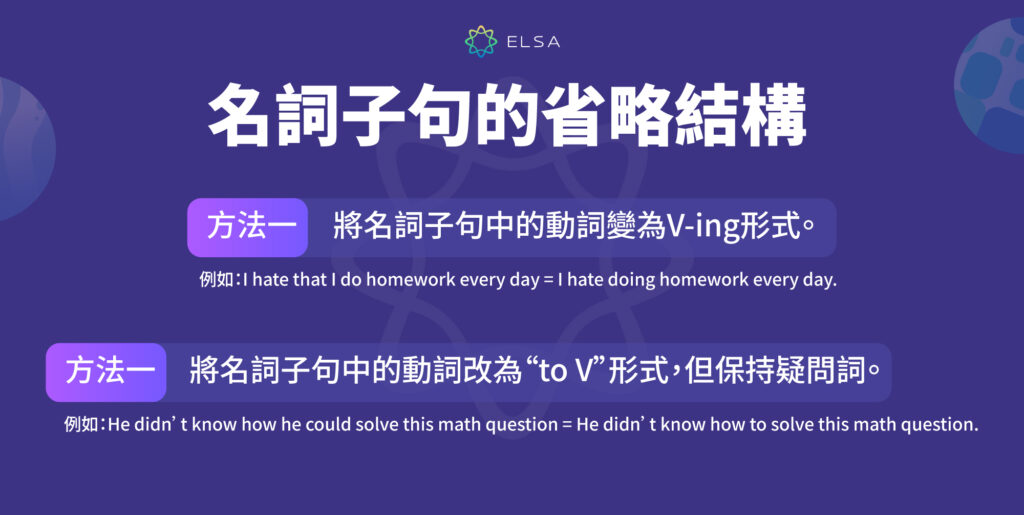
情況 1: 將名詞子句的動詞變為 V-ing 形式。
這種情況通常適用於以 that 開頭的名詞子句。
| 基本結構: 主語 + 主動詞 + that + 主語 + 名詞子句的動詞 + (其他成分) 簡化結構: 主語 + 主動詞 + V-ing + (其他成分) |
例子: I hate that I do homework every day = I hate doing homework every day.
大致翻譯: 我討厭每天做作業。
情況 2: 將名詞子句的動詞變為“to V”形式,但保留疑問詞。
這種情況通常適用於以 what, who, why, where, when, which 或 how 開頭的名詞子句。
| 基本結構: 主語 + 主動詞 + 疑問詞 + 主語 + 名詞子句的動詞 + (其他成分) 簡化結構: 主語 + 主動詞 + 疑問詞 + “to V” (其他成分) |
例子: He didn’t know how he could solve this math question = He didn’t know how to solve this math question.
大致翻譯: 他不知道如何解決這個數學問題。
名詞子句的功能
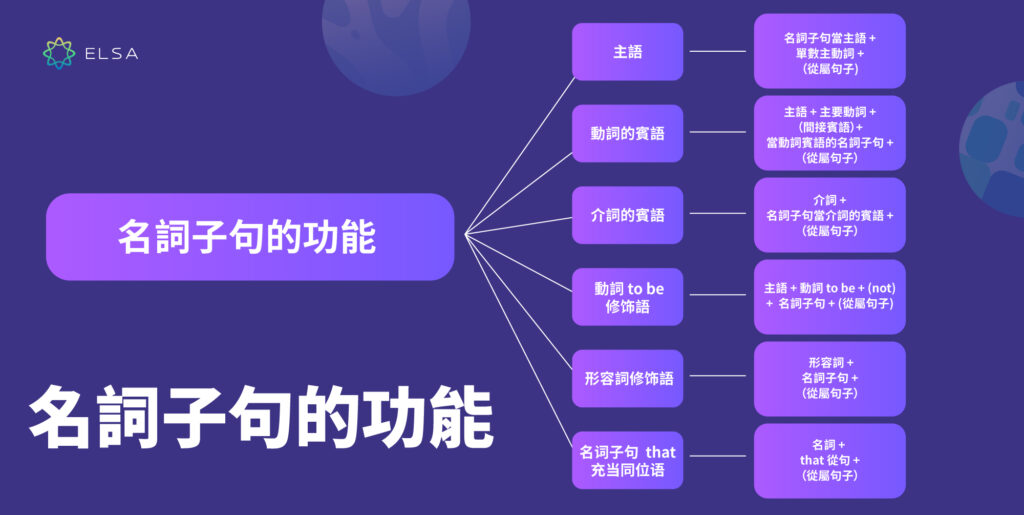
名詞子句作為句子的主語
名詞子句可以作為句子的主語,並位於主語前。學者應當留意,當名詞子句作為主語時,動詞應使用單數形式。
| 名詞子句作主語 + 單數主動詞 + (其他成分) |
例子:
- That the Earth is getting hotter worries everybody.
大致翻譯: 地球變得越來越熱的事實讓每個人都感到擔憂。
- What I ate last night was two bananas.
大致翻譯: 我昨晚吃的東西是兩根香蕉。
名詞子句作為動詞的賓語
名詞子句可以作為句子中動詞的賓語,並位於主動詞後。作為動詞的賓語時,that 可以被省略。
| 主語 + 主動詞 + (間接賓語) + 名詞子句作為動詞的賓語 + (其他成分) |
例子: Emily knows how to ride a motorbike.
大致翻譯: Emily 知道如何騎摩托車。
名詞子句作為介詞的賓語
名詞子句可以作為介詞的賓語,並緊跟在介詞後面。在此的作用時, that 子句不能使用。
| 介詞 + 名詞子句作為介詞的賓語 + (其他成分) |
例子: We are planning on how to start this project.
大致翻譯: 我們正在計劃如何開始這個項目。
名詞子句作為 to be 的補語
名詞子句可以作為 to be 動詞的補語,並緊跟在 to be 動詞後。
| 主語 + to be 動詞 + (not) + 名詞子句 + (其他成分) |
例子: My son was crying because the gift was not what he wanted.
大致翻譯: 我的兒子因為禮物不是他想要的而哭了。
名詞子句作為形容詞的補語
名詞子句可以作為形容詞的補語,並緊跟在形容詞後面。當時,名詞子句的作用通常解釋該形容詞的原因,回答“為什麼對象會有這種狀態”的問題。
| 形容詞 + 名詞子句 + (其他成分) |
對於 that 子句
當 that 子句在句中作為形容詞的補語時,“that” 可以被省略。以下是 that 子句可以修飾的形容詞:
- Afraid – 擔心
- Convinced – 被說服
- Impatient – 不耐煩
- Amused – 愉快
- Delighted – 高興
- Pleased – 滿意
- Annoyed – 煩惱
- Determined – 決心
- Proud – 自豪
- Anxious – 焦慮
- Eager – 渴望
- Sorry – 抱歉
- Aware – 意識到
- Glad – 開心
- Sure – 確定
- Certain – 擔保
- Happy – 幸福
- Surprised – 驚訝
- Confident – 自信
- Horrified – 恐懼
- Willing – 願意
- Conscious – 清楚
例子: I am pleased (that) the food at this restaurant is delicious.
大致翻譯: 我很滿意這家餐廳的食物很好吃。
對於其他名詞子句
名詞子句還可以修飾以下形容詞: sure 和 certain。
例子: I’m not sure who I should talk to.
大致翻譯: 我不確定應該和誰說話。
疑問詞 “how” 和 “what” 也可以開頭引導名詞子句,作為形容詞的補語,此時說話人想表達驚嘆的意思。
例子: They were shocked how deep the diver could dive.
大致翻譯: 他們對這位潛水員能潛得這麼深感到震驚。
that 子句作為同位語修飾其他名詞
That 子句還可以作為名詞的同位語(in apposition to a noun)。在這種情況下,在名詞子句that 不能省略。
| 名詞 + that 子句 + (其他成分) |
例子: She cannot accept the fact that she has failed the test.
大致翻譯: 她無法接受她考試不及格的事實。
閲讀更多:
區分名詞子句和名詞短語

相同點: 都在句中充當名詞角色。
不同點:
| 名詞子句 | 名詞短語 | |
| 不同點 | 有主語和謂語,但作為從屬子句,不能表達完整的意思。 | 由一組詞組成,包括名詞,但沒有動詞。 |
| 例子 | The moviegoers forgot what the hero did in the first half of the film. 大致翻譯: 觀眾忘記了主角在電影前半部分做了什麼。 | Hanna knows the back streets. 大致翻譯: Hanna知道後面的街道。 |
使用名詞子句時常見的錯誤

未能區分名詞子句和關係子句
名詞子句和關係子句中的關係代詞(that, which, who, whom, whose)常常混淆,因為它們都出現在句子中,但在不同的子句中起不同的作用。
為了解決這個問題,學習者需要了解這些代詞”that” 或 “which” 在不同子句中的功能,以正確區分名詞子句和關係子句,並檢查句子的結構以確保準確性。
- 對於關係子句
例子: The book that I read last week was very interesting
大致翻譯: 我上週讀的那本書很有趣。
解釋: 此子句中的 “that” 是用來確定或解釋前面的名詞 “the book”。
- 對於名詞子句
例子: That I got a low grade in History yesterday doesn’t mean I’m not smart.
大致翻譯: 我昨天歷史考試得了低分並不意味著我不聰明。
解釋: 此子句中使用 “that”但沒有解釋/擴展前面名詞的的作用(關係代詞的作用) ,而是名詞子句的開頭詞和在名詞子句中位於主語前面。
未能區分名詞子句中的時態
名詞子句中的動詞時態應與該子句中動作的時間相對應。然而,由於名詞子句中的時態形式與主句的時態相同,這可能會引起混淆。
為了避免這個錯誤,讀者應仔細考慮上下文,並掌握句中的時間點,以選擇正確的時態。此外,還應運用簡單的動詞規則來區分句子中的不同時態。
例子:
- 現在時的名詞子句: I hope that he comes to the party tonight.
大致翻譯: 我希望他今晚能來派對。
- 過去時的名詞子句: I remember what she said yesterday.
大致翻譯: 我記得她昨天說的話。
混淆 who 和 whom
“Who” 和 “whom” 都是用於名詞子句中指代人的關係代詞。然而,”who” 用作主語,同時也是名詞子句的謂語,而 “whom” 用於名詞子句中作為謂語。
為了避免這個錯誤,讀者可以使用一個簡單的規則:”who” 用於主語位置,而 “whom” 用於賓語位置。
例子:
- Who (主語) is driving the car?
- Whom (賓語) did you meet yesterday?
混淆 that 和 whether
| 詞 | 用法 | 例子 | 翻譯 |
| That | 用來陳述一個肯定、信息或事實。 | I heard that he is coming to the party tonight. | 我聽說他今晚會來參加派對。 |
| Whether | 用來提出問題或描述兩種或更多可能性之間的選擇。 | Do you know whether he is coming to the party tonight? | 你知道他今晚是否會來派對嗎? |
名詞子句練習題
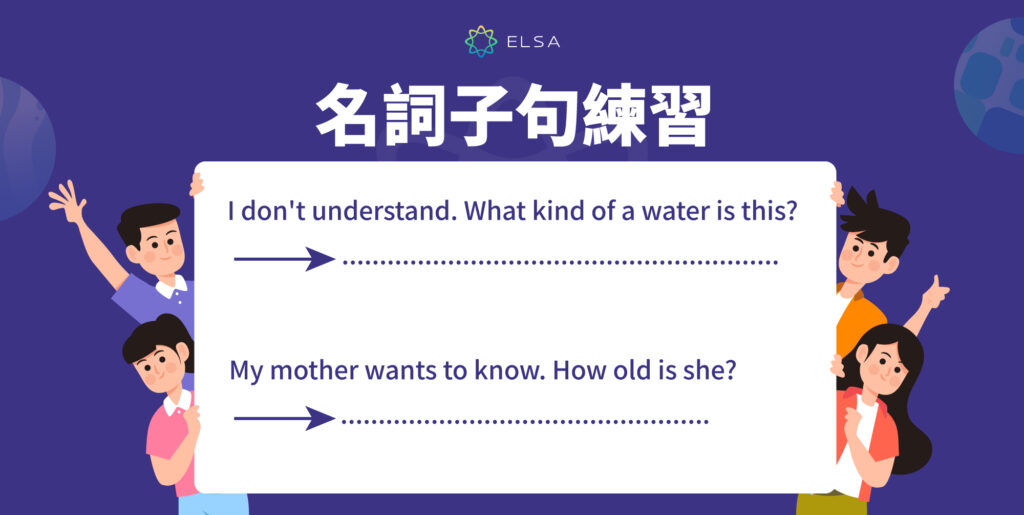
練習1. 將以下兩個句子合併為一個完整的句子,使用名詞子句
1. I don’t understand. What kind of a water is this?
→ __________________________
2. My mother wants to know. How old is she?
→ __________________________
3. I am insecure. Which pages are we reading?
→ _________________________
4. Presidents claim. They will progress covid-19 vaccine.
→ _________________________
5. Who is that boy? Everyone knows.
→ __________________________
6. Could you show me? Where is the post office?
→ __________________________
7. Do you remember? How long have we learned French?
→ ___________________________
8. Please tell us. What did you see?
→ ___________________________
答案
1. I don’t understand what kind of water this is
2. My mother wants to know how old she is.
3. I am insecure about what pages we are reading
4. Presidents claimed that they will progress covid-19 vaccine.
5. Everyone knows who that boy is
6. Could you show me where the post office is
7. Do you remember how long we have learned French
8. Please tell us what you saw
練習2. 找出以下句子中的名詞子句,並確定其功能。
1. The queen ordered that the traitor should be put into prison.
2. Linda declared that he would attend the celebration.
3. We are aware that she is uninterested in the film.
4. My daughter reckons that he felt nausea.
5. I don’t believe what she says. She consistently lies.
6. She doesn’t know where her mother went.
7. That other students could be processing a similar project never occurred to him.
答案
1. that the traitor should be put into prison → 賓語
2. that he would attend the celebration → 賓語
3. that she is uninterested in the film → 賓語
4. that he felt nausea→ 賓語
5. what she says → 賓語
6. where her mother went → 賓語
7. That other students could be processing a similar project → 主語
練習 3. 選擇正確答案
1. My father often thinks …………….. he is getting on.
A. what
B. how
C. that
2. I want to know ………….. my wife is angry with my son.
A. that
B. why
C. which
3. James asked his friend ……..he knew his address.
A. if
B. how
C. why
4. His father asked …………….. she would not participate in the group.
A. if
B. that
C. whether
5. I believed ………… he would take part in the race.
A. that
B. what
C. which
6. She doesn’t know …………. she can escape this prison.
A. that
B. how
C. where
7. Pay attention to ……………… the tutor is going to declare.
A. that
B. what
C. how
8. He told my father ………….. he would be happy to participate in my birthday party.
A. that
B. why
C. how
答案
| 1 | 2 | 3 | 4 |
| B | B | A | B |
| 5 | 6 | 7 | 8 |
| A | B | B | A |
常見問題
That 名詞子句是什麼?
That 名詞子句以 that 開頭,充當句中的名詞,作為主語、賓語或補語。
例子: That he passed the exam is surprising.
大致翻譯: 他通過考試這件事真令人驚訝。
How 名詞子句是什麼?
How 名詞子句以 how 開頭,通常表達方式或方法,並在句中充當名詞。
例子: How he solved the problem amazed everyone.
大致翻譯: 他解決問題的方式讓大家感到驚訝。
Wh 名詞子句是什麼?
Wh 名詞子句以疑問詞 (what, who, where, …) 開頭,在句中作為名詞使用。
例子: What she said was true.
大致翻譯: 她說的話是真的。
以上是 ELSA Speak 整理的所有關於名詞子句的知識,希望這篇文章能為你提供有用的知識,請繼續關注 ELSA Speak 的其他文章,在英語文法專欄觀看!


 2024年/09月/30日 | Linh Chau
2024年/09月/30日 | Linh Chau



